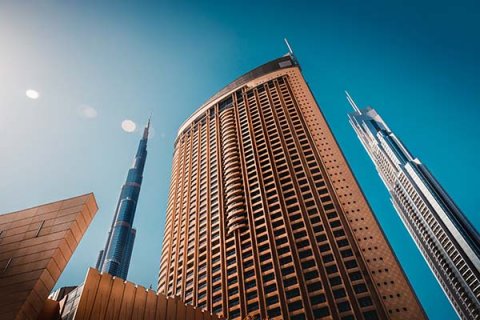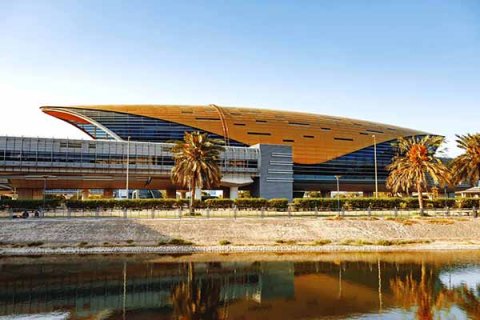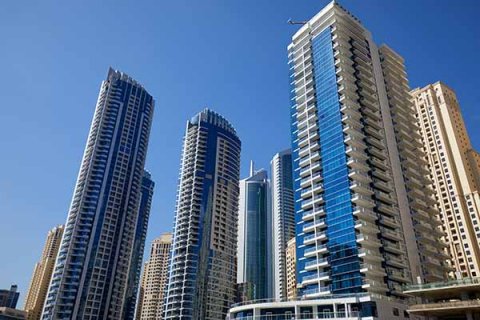Non-residents can be daunted by buying real estate in Dubai. However, if you enlist the services of a trusted specialist with extensive experience, the process will turn to be less complicated.
In 2021, a great number of investors and wealthy individuals have become interested in how to buy real estate in Dubai on the back of the booming UAE property market.
In this article, we’re going to tell you more about buying real estate in Dubai.
Contents
- How to buy a property in the UAE if you are non-resident?
- Real estate transaction stages
- Foreign buyers protection
- Taxation
- Is it possible to buy an apartment in Dubai remotely?
- Pros and cons of buying remotely
- Tips for first-time buyers
- We will help you become an owner of real estate in Dubai
How to buy a property in the UAE if you are non-resident?
Dubai real estate market offers an abundance of options to suit your purposes, budget, and lifestyle. When we think of real estate in Dubai, many of us will imagine luxury villas and upscale penthouses.However, cheap apartments in Dubai are also sought-after.
To become an owner of an apartment in Dubai, you need to complete the following stages of a real estate transaction:
- Sign a sales and purchase agreement (SPA)
- Pay a deposit of 5-25% of the property value depending on the type of the transaction and property
- Sign an annual home maintenance contract
- Complete the registration procedure and receive a title deed
Real estate transaction stages
The real estate transactions in Dubai are strictly regulated by the UAE authorities, therefore, the interests of both the seller and the buyer are protected. The process includes the following important stages:
- After you have chosen a property, you need to contact the property owner and negotiate the sale terms;
- State the sale terms in the documents: Form A and Form B;
- Paying a security deposit. The buyer issues a cheque to the seller in the amount of about 10% of the property price. Prior to the completion of the transaction, the deposit cheque is held by the seller's broker or a neutral third party. If the buyer refuses to buy, the money is paid to the seller.
- Obtaining a No Objection Certificate (a NOC) – in the office in the presence of the developer or remotely via the RERA app;
- Signing a sales agreement. The seller and buyer sign a Memorandum of Understanding (a MoU) also known as Form F. This stage of the transaction requires the participation of a real estate agent or broker who will help to consider all the nuances and check the correctness of the information specified in the agreement. The property transaction is registered in the presence of both sides in the Registration Trustee Office.
When registering the property transaction, the parties must have the following papers:
- A proof of payment;
- An ID (for instance, an Emirates ID);
- An NOC with the developer’s signature;
- A notarized and signed memorandum.
After the IDs and the signatures are verified, Dubai Land Department (DLD) provides the buyer with a Title Deed.
.jpg)
Foreign buyers protection
Here are things a prospective buyer needs to know before becoming a UAE homeowner:
- The United Arab Emirates and Dubai in particular have long-standing economic stability and favorable investment climate.
- The UAE government keeps substantial control over the purchase and sale transactions in the residential market and protects the interests of participants.
- There are 66 freehold zones in the UAE, where a foreign citizen can become an owner of the purchased property.
- Most developers are state-owned and therefore are mandatorily licensed. The same goes for real estate agencies.
- With the weakening of the coronavirus pandemic, new investors and buyers flocked to the housing sector, boosting the properties’ ROIs.
Taxation
There are no property taxes in Dubai, however, all foreign buyers and homeowners have to pay several mandatory fees:
- The title deed transfer fee, which is 4% of the property value. It is paid in equal parts by the seller and the buyer, or solely by the buyer, upon mutual agreement.
- The title deed issuance fee in the amount of 2,000 AED ($545) for a property worth below AED 500,000 ($136,130).
- Real estate brokers agency fees of 2% of the transaction value, which are divided 50/50 between the buyer and the seller, or paid solely by the seller.
- Admin fees to be paid to the Dubai Land department totaling AED 4,200 ($1,143).
If the buyer uses a mortgage to buy a property, they need to pay a bank mortgage arrangement fee of 1% of the loan amount and a mortgage registration fee to DLD which is 0.25% of the total mortgage value, plus admin fees of AED 290.
Is it possible to buy an apartment in Dubai remotely?
Of course, yes. During the pandemic, online home buying rescued the Dubai property market from falling off the cliff and staved off a recession. The technology facilitated property buying and selling for overseas customers.
Buying UAE apartments and villas online is an excellent chance to find and buy a property on favorable terms.
The major advantage of online transactions is no need to be present in the United Arab Emirates. The buyer can view housing options from anywhere, communicate with the agent and the owner at a convenient time. All the steps to complete a real estate transaction can be done remotely.
There are two ways:
- Remote selection of a property. A potential buyer looks at the options on the real estate website and asks for help from a specialist to make the optimal decision.
- Online property viewings are one of the indisputable advantages. You don’t need to go to view the properties by yourself. The real estate agent will do it for you. After selecting several options that you like, the agent will arrange a real-time property showing, commenting on its features.
.jpg)
Pros and cons of buying remotely
Buying real estate online remains relevant, despite the loosening of the pandemic-related restrictions. First, because it is convenient, and second, it is profitable.
Here are the advantages of buying apartments remotely:
- Saving money and time. There are no costs for a flight to another country, hiring translators and other expenses associated with the trip.
- Selecting a housing unit at a convenient time from anywhere in the world
- Making use of comprehensive home search tools
- Communicating with a real estate agent and owner by online messages or via a video call
- Competing with other homebuyers in the online marketplace
Cons of remote home buying:
- Doubts associated with impossibility of a personal inspection of a housing unit
- The higher risk of choosing the wrong property
- The risk of a UAE bank's refusal to open an account in the name of a foreigner
Tips for first-time buyers
1. Know what you want
An obvious purpose of the purchase will narrow down the search, helping you to weed out unnecessary options. Stay alone with your thoughts and answer yourself the question of what you would want. Is it an inexpensive rental property in Dubai? Or spacious apartments for family life? Analyze your own expectations to understand what type of housing you exactly need.
2. Find your dream location
Location is one of the most important factors in the quality of life and is equally important for the return on investment. Don’t be afraid to let your heart choose as well. What area do you want to live in?
Decide on what matters most for you. Whether you need a neighborhood from where you can easily get to your work, or which has shops, kindergartens, schools and hospitals nearby make your own checklist.
If you look for a commercial property, consider densely populated and landmark areas in the heart of the city which have properties with the highest ROIs. Communities located there are also home to foreign students, entrepreneurs, and office workers and connected with a well-developed transport system.
3. Find a trusted real estate agent
Like developers, real estate agencies in Dubai are accredited by the government. Every real estate company is registered with the Dubai Economic Department (DED) within the Brokers Registry. Real estate agents regularly undergo qualification courses and confirm their knowledge. That is why the risk of stumbling upon an unscrupulous agent is extremely low. However, before relying on a realtor, check their license and learn more about them.
4. Check the seller
The identity of the owner can be verified through the Dubai Land Department (DLD). This authority is responsible for the transfer of ownership in the purchase and sale of a property. You can also request an original title deed.
5. Save up a solid amount
To buy an apartment or a villa in Dubai, you need to be ready to cough up a hefty sum. Apart from paying the property price and fees, you will also need to pay for the lawyer, agent and translator services. In addition, if you’re going to use mortgage funds, the bank will ask for 25 percent of the home value.
We will help you become an owner of real estate in Dubai
Looking to buy an apartment in Dubai but don't know where to start? We will help you make your choice and become the owner of the desired property. Our specialists will find a property, inspect it, prepare the required documents, organize negotiations with the owner and provide comprehensive support for the transaction.
For searching and buying real estate in the United Arab Emirates, please contact us through the website. We will select an apartment according to your needs and budget.





